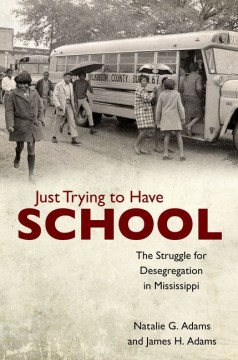By Steve Yates. Special to the Clarion-Ledger Sunday print edition (February 17)
“You realize you are digging up some old bones,” Leon Johnson, one of the first black students to integrate DeKalb High School in Kemper County, told author James H. Adams.
 Both James and his coauthor Natalie G. Adams could identify with this sentiment firsthand. They, too, had experienced desegregation 45 years before Johnson closed a phone call with those fitting words. James and Natalie kept digging, and the result is the sweeping history Just Trying to Have School: The Struggle for Desegregation in Mississippi.
Both James and his coauthor Natalie G. Adams could identify with this sentiment firsthand. They, too, had experienced desegregation 45 years before Johnson closed a phone call with those fitting words. James and Natalie kept digging, and the result is the sweeping history Just Trying to Have School: The Struggle for Desegregation in Mississippi.
After the 1954 Brown v. Board of Education ruling, no state fought longer or harder to preserve segregated schools than Mississippi.
“We’ll go on as always.” “It won’t affect us.” “Let them enforce it.” The authors glean these quotes that rolled in defiance from the tongues of superintendents that year in Mississippi.
This massive resistance came to a crashing halt in October 1969 when the Supreme Court ruled in Alexander v. Holmes Board of Education that “the obligation of every school district is to terminate dual school systems at once and to operate now and hereafter only unitary schools.”
Over seven years the authors interviewed more than one hundred parents, teachers, students, principals, superintendents, and school board members who did the heavy lifting in what the authors call “one of the most significant social and educational changes in the twentieth century.”
Thirty of the thirty-three Mississippi districts named in the 1969 case were ordered to open as desegregated schools after Christmas break. With little guidance from state officials and no formal training or experience in effective school desegregation processes, ordinary people were thrown into extraordinary circumstances. Before this book, their stories were largely ignored in desegregation literature.
The tasks the authors described proved arduous and complex. How were bus routes determined? Who lost their position as principal? Who was assigned—students and teachers—to what classes?
Without losing sight of the important larger forces in precipitating social change, the authors shift attention to how the daily work of “just trying to have school” helped shape the contours of desegregation in communities still living with the decisions made fifty years ago.
Natalie G. Adams is director of New College and professor of social and cultural studies in education at the University of Alabama. She is co-author of Cheerleader! An American Icon and co-editor of Geographies of Girlhood: Identities In-Between. James H. Adams is professor of instructional systems and workforce development at Mississippi State University. He has published articles in the Journal of Career and Technical Education, the International Journal of Instructional Media, the Journal of Interactive Learning Research, and the Journal of Critical Education Policy Studies.
The thorough authors provide chapters that cover almost every aspect of public-school life. There are chapters on black parents, superintendents, principals and local enforcement, teachers, sports, and extracurricular life such as dances, or the lack thereof. The authors include two telling chapters on resistance and protest and on what they call resistance through exodus in the flight of white families to private academies.
And there is an invaluable and necessary chapter on lessons learned. Was it a success? The authors hear from multiple authorities that that measure is relative to the metrics applied and the context of the narrative demanded. But this book, reliant above all on oral history, that great, leavening counternarrative, yields unforgettable quotes.
The authors cite Joy Tyner, principal at Clinton’s Northside elementary: “I love the fact that I can walk down the hall and look into any class and it looks like Mississippi.”
Steve Yates lives in Flowood and is the author of the novels The Legend of the Albino Farm, Morkan’s Quarry, and The Teeth of the Souls.
Natalie Adams will appear at the Mississippi Book Festival August 17 as a participant in the “A Spotlight on Mississippi Civil Rights” panel at 12:00 p.m. at the State Capitol Room 201 A.



Comments are closed.